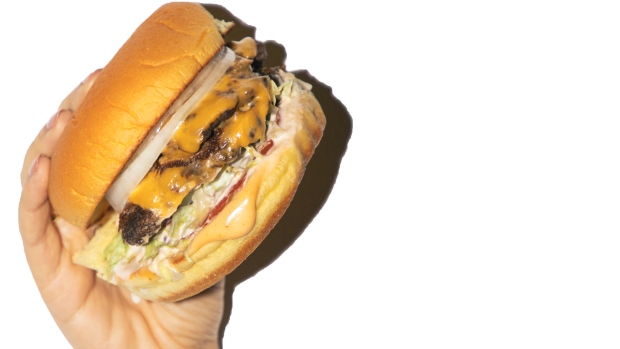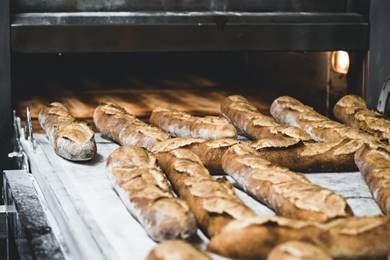Oct 8, 2021
'We've been resilient, it hasn't been easy': Canadian small businesses on navigating COVID
, BNN Bloomberg

For the past year and a half, the COVID-19 pandemic has created unprecedented conditions for small business owners across Canada.
This October, BNN Bloomberg is celebrating Small Business Month by highlighting various Canadian entrepreneurs who are navigating their company around headwinds like supply shortages to virus outbreaks.
From cocktail bars to gardening companies, here are the stories of resilient small business owners who are pivoting and growing their business despite a global pandemic.
After a successful three-day pop-up in 2019, Chieff Bosompra expanded his idea for a Toronto burger joint into a takeout-only business that features Ghanaian flavours.

Bosompra said while it’s been tough figuring out on-the-go how to run a restaurant during the pandemic, he’s been able to avoid the significant blow from COVID-related restrictions since he never offered dine-in services.
“It’s been kinda easier to remain as minimal as possible just with all the different changes that have been happening,” Bosompra said.
“That way we are not in flux, especially being a small business and young business, we don’t want to take on staff and let them go.”

Nathan Newman, a Calgary-based cocktail bar owner, said they have learned how to adapt with fluctuating COVID-related restrictions but it hasn’t been a smooth ride.
“We’ve been resilient, it hasn’t been easy. It’s definitely been a lot of anxiety, sleepless nights and some stress throughout the time,” the owner of The DERRICK Gin Mill and UNTITLED Champagne Lounge, said.
“I’d be lying if I told you anything different than that. But I will say it made me look at the business differently.”
Even Toronto’s most exclusive event venues haven’t been safe from the massive impact COVID has had on businesses.
Casa Loma, a 107-year-old picturesque castle and estate gardens that’s perched over the downtown core with a view of the CN Tower, has experienced a plunge in bookings with restriction uncertainty; but there could be a light on the horizon.

Nick Di Donato, president and CEO of the Liberty Entertainment Group, said interest in their venues like Casa Loma have started picking up again and said there are some positive outcomes from this whole experience.
“One of the biggest wins for the hospitality industry over the past year and a half is that people realize how important restaurants and events are to their lives after being locked up… people, I think, will remember that and as we move forward for the next couple of years hopefully that will be a gain in respect for the hospitality industry.”
Family-owned Konzelmann Estate Winery normally has waves of American tourists visiting their Niagara vineyard but this year they have barely seen any customers from south of the border despite easing travel restrictions.

But their biggest challenge hasn’t been the reduced number of visitors but actually getting containers to bottle their wine.
“It was back in the early spring that we started hearing about supply chain issues…sometimes we are having to wait quite a bit longer and the prices have really increased,” Vice President Jim Reschke said.
“We are seeing almost the double of cost of a bottle as compared to about a year ago.”
Wineries aren’t the only businesses experiencing supply shortages for the most basic items to run their operations. Le Dolci Bakery & Culinary Classroom Owner Lisa Sanguedolce said she’s having issues sourcing boxes to transport baked goods.

“We’re having a very hard time sourcing boxes and ingredients. Things have been delayed for months and months and we keep getting open-ended answers saying next week,” said Sanguedolce.
“We don’t really have a timeline for when we are going to get stuff…for our bakery, we work with Loblaws Inc., Pusateri's Fine Foods and Fortinos and we are running out of boxes to supply our cakes to them.”
Despite significant challenges with staffing and getting specific products, some small businesses have benefited from Canadians picking up new hobbies amid restrictions.
Aaron Saks, President of West Coast Seeds, said they’re still experiencing the same surge in demand for gardening that they did during the very first lockdown.
"The pandemic is still a topic of conversation every day in the business and we’re still seeing major growth as a result of people still unfortunately being stuck at home," Saks said.
Businesses like Saks’ are also hoping by creating connections with customers now, they’ll be able to grow that bond into a lifelong relationship.
"Our goal during the pandemic when we saw a lot of people really flocking to gardening was let’s get these people hooked on gardening, let’s provide them with advice and easy to grow products so that they can have success in year one, and if they do have success maybe we’ve hooked a customer for life," Saks explained.

Toronto-based shop owner Scott Olsen said it’s easy to overwork yourself when you’re not sure what’s in store a week, or even a month, from now.
“We’re commission based in a lot of circumstances so you’re not used to saying ‘no’ to business or clients and it can be overwhelming, especially when you don’t know what’s around the corner,” the Matchbox Tattoo Company owner said.
“I feel like there’s a great possibility that you can overwork yourself and I mean, again, these are all good problems. We’re lucky to be open, we’re lucky to be a shop that was able to reopen and stay in business but definitely that’s a concern.”
Some businesses are benefiting from the different trends that have emerged over the past 19 months.

Seth Gabrielse, chef and co-owner of the Automne Boulangerie, said he benefited from Canadians buying up flour to make bread at the beginning of the pandemic but it’s also fueled an unexpected renewed interest in baking as a career.
“A secondary boost that we’re seeing now is people who really got into the craze at the beginning really started to take a second look at baking and bakeries as a potential career move,” Gabrielse said.
For other industries like hospitality that are still struggling to find workers, owners are optimistic things could turn around for the better but it could rely on government intervention.

Jocelyn Maurice, managing partner at Elora Mill Hotel & Spa, said political leaders ultimately need to step in to help train workers in their sector after significant turnaround during the pandemic.
“I’m hopeful. I think we lost a lot of people out of the business. I think it’s giving us a chance to reevaluate what is great about our business and really working on a plan forward,” Maurice said.
“It’s not all going to come at once. I think it’s going to take a really long time. I’m hopeful the government is going to support us in recruiting new talent and the kind of effort it’s going to take in getting people trained back up.”
While the pandemic has weighed on many small businesses, it hasn’t taken away Canadians’ entrepreneurial spirit - with some individuals launching new companies during lockdown.

Tammy Maki, chef and owner of Raven Rising, launched her chocolate business that uses traditional Indigenous ingredients in October 2020.
Instead of taking the usual route of opening up a storefront, Maki decided to start her business completely online.
“I was watching storefronts close in downtown Sudbury, Ont. and I knew that you couldn’t go with anything that was traditional anymore so e-commerce was definitely the only option for me,” Maki said.
“You know, no storefront needed and we were so, and still are, a little bit unsure about the world today so you just have to change your way of thinking.”